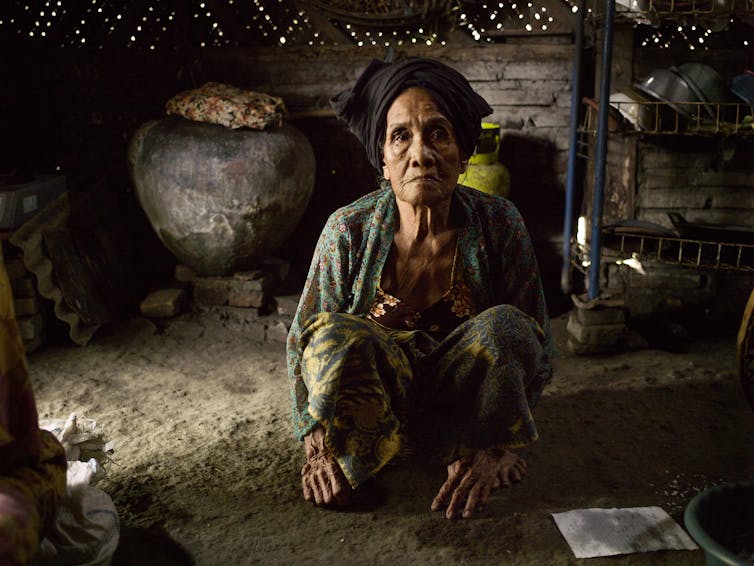This article is part of a series to mark Indonesian Mother’s Day or Women’s Day on December 22.
Next week, Indonesia celebrates Hari Ibu, or Mother’s Day, to honour the 1928 Indonesian Women’s Congress, which heralded women’s involvement in the anti-colonial independence movement.
Public events, often led by the wives of high-ranking government officials, commemorate Hari Ibu. Messages abound about women’s plight, but also their strengths and their roles in the nation.
Hari Ibu draws on the image of ibu, as virtuous wife and mother, but this is not the only stereotype of femininity in Indonesia.
Janda is an Indonesian term covering both widows and divorcees. No longer being in a heterosexual marriage and not having a male spouse, janda have lost the respected status of ibu and are considered available to other men. In other words, janda represents the antithesis of the ideal of ibu.
Our research and other studies on the stigmatisation of widows and divorcees find that the janda stereotype pervades the lives of Indonesian women. It often results in them living precarious lives marginalised in their communities.
Ibu versus Janda stereotypes
Particularly under Suharto’s New Order (1966–1998), but also afterwards, the state has fostered an ideal of femininity based on the image of ibu: women should adhere to their biologically determined nature as caring wives and mothers.
This explicit gender ideology emphasises faithful, heterosexual marriage. For a woman, being a wife and mother is the way to contribute to society. Working and earning money is acceptable providing it does not interfere with those primary expectations.
This state ideology was (and is) principally communicated during Hari Ibu and Kartini Day, when Indonesians commemorate their heroine of women’s empowerment – Raden Ajeng Kartini.
A large feminist literature, both from within Indonesia and by foreign observers, criticises this state-constructed image of the ibu.
The main critique is that state-sanctioned women’s groups like Dharma Wanita (an organisation for the wives of civil servants) reinforce the official paradigm of women’s primary roles as being in the domestic sphere rather than being equal citizens capable of contributing in the public domain.
Official discourse does not promote the janda image. But the image is prevalent in popular culture and this affects the lives of actual widows and divorcees.
Particularly if young and attractive, janda are presumed to be promiscuous and lascivious. Men fantasise about janda, while married women fear janda will lead their husbands astray. Popular culture and private gossip reproduce this image, leading to real-life exclusion and stigma.

Ethnographic research
Our ethnographic research explored how the janda stereotype affects the social identity and livelihood options of widows and divorcees in three different communities: a village in Java, a migrant-dominated mining town in Kalimantan (Indonesian Borneo) and among Indonesians living in Australia.
These sites are loosely linked by a possible life trajectory where a woman might marry and divorce in her home town in Java, then migrate to Kalimantan in search of work, and eventually meet and marry an expatriate mine worker and follow him back to his home country.
As a male researcher in a Javanese village, Nicholas Herriman observed men discussing their desire for janda. The men would point out the local janda to each other and speculate about seducing them. Men believed janda are sexually experienced, lonely and amenable to sex, “free” or paid.
Whether or not a janda is actually a sex worker, she is subject to the same presumptions. Notably, none of the male gossip ever included fancies about an ibu.
As well as being the objects of lascivious gossip, janda were often excluded from social activities performed by respectable ibu. But janda also sometimes found greater personal freedom of movement and relief from their former husbands’ requests for cigarette and gambling money.
Some widows and divorcees migrate to escape the janda stigma and/or to seek better livelihood options. Petra Mahy interviewed several such migrant janda in a Kalimantan mining town. She found the stereotype was still prevalent even within the town’s multi-ethnic migrant population.
The migrant janda related how they needed to protect themselves from men’s advances, including from rape, while struggling to earn a living.
For example, one widow said she found more personal and financial freedom following the death of her husband. But she always carried a small pair of scissors with her in case visiting men went too far.
Another woman, a divorced sex worker in her twenties, said it was hard to be a janda back in Java. She would have nowhere to live, people would gossip about her and women would be afraid to let their husbands speak to her. At least in Kalimantan, she said, she was able to earn money anonymously and send it home to support her children.
Even janda migrating to another country could not free themselves from those stereotypes.
Monika Winarnita conducted research among migrant Indonesian women in Australia. These women formed an Indonesian cultural dance troupe.
Some dancers, formerly janda, had remarried to Anglo-Australian men, moving to a financially secure life with their husbands in Australia. Yet these former janda were apparently not entitled to the high social status reserved for the wives of consular officials and other highly respected ibu.
Undoubtedly this was partly due to social snobbery. But it also reflected negative stereotypes about their past and the presumed deviant circumstances under which these former janda met their Anglo-Australian husbands.
In all three sites, janda were ostracised from a range of mainstream social activities. This is one reason their households are often among the poorest.

Avenues for change
Overall, our research indicates that the janda stereotype pervades the lives of the Indonesian women who attract this label. They are often pursued by men on the presumption they are sexually available.
Some janda attempt to guard their reputation and present a virtuous image, while trying to make ends meet.
It must be acknowledged that changing deep-seated cultural stereotypes is difficult. Yet it seems to us that events on the national calendar like Hari Ibu present an opportunity for Indonesian leaders, civil society organisations and policymakers to explicitly acknowledge the difficulties faced by janda and other women living precarious lives as a result of being marginalised in their community.
Indeed, an alternative vision may be emerging as we saw in a 2017 student demonstration on Hari Ibu demanding recognition of jandas’ predicament.
There is more to jandas’ lives than the stigma, shame and opportunities identified here, just as there is more to being an Indonesian woman than simply motherhood. So perhaps it is time to reflect and embrace different kinds of female identities on Hari Ibu.


